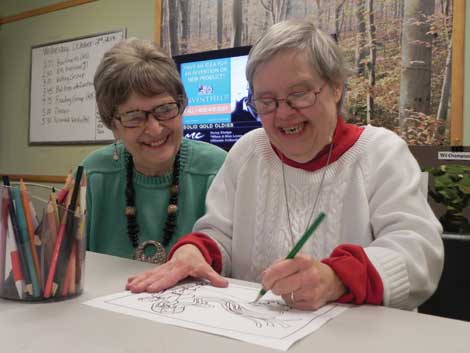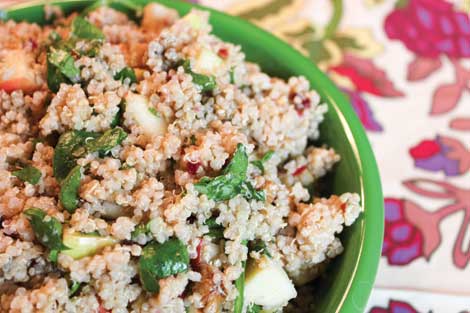Memory care makes Raanah smile
Every day is a good day for Raanah Aanstead. But three days each week, she is in the best place.
Par“People make me smile,†she said. “They make me feel special.â€
For a little over a year, Raanah has been going to Cascade Park Active Day, an adult day health center in Tacoma’s Stadium district. She participates in a special program for individuals experiencing memory loss or dementia.
Sixty-one years ago, Raanah was born into a large family in North Dakota. She has Down Syndrome and is now experiencing some early-stage memory loss. Today she lives with her sister, Lonnie McWilliams. Lonnie makes sure Raanah’s needs are always met.
McWilliams learned about the memory care and wellness services at Cascade Park after connecting with Pierce County Community Connections’ Aging and Disability Resources. The county partners with Cascade Park under a federal project to offer specialized adult day services for families that deal with Alzheimer’s and other dementias. The program helps both the caregiver and the care recipient. It includes an exercise component for the program participant, as well as extra support for the caregiver.
Raanah has always been active. She worked for 17 years at the Safeway grocery store in Federal Way. She worked hard to keep the store clean.
“They treated me like a person,†she recalls. That gave her the independence, affirmation and dignity that she desired.
McWilliams is impressed with what she is seeing now for her sister.
“The people who come to the program here at Cascade Park are all actively engaged in doing something. They’re not vegetating. I see stimulation here,†she said.
Looking for help – any help – McWilliams talked with a good friend who leveled with her: “I saw Raanah as just vegetating. She needed to be around other people and become involved.â€
That’s when she called Cascade Park. She and her sister visited to preview the facility and the program. She recalls that “Raanah had a ball, and I knew then that this would work for her.â€
Raanah now participates in a five-hour afternoon memory care session. When the shuttle comes to pick up Raanah at her home, her face lights up. She knows she is in for a treat.
As much as it is a special day for Raanah, it also serves as a break for McWilliams. “Her days are full and she’s much more stimulated,†McWilliams said. “And it makes my job much easier. It gives me an important break to do other things.â€
Being a full-time caregiver is hard work. McWilliams has accepted that responsibility since 1992, in addition to dealing with her own chronic condition. To survive and stay healthy, she has developed a strong support system, something that every caregiver knows to be important.
“I have a number of good friends who help, and my church has been phenomenal,†said McWilliams. “I also go to a support group that is held at Cascade Park. It’s not a pity party by any means. There’s lots of advice time, sharing among the family members and caregivers what they would do in certain situations. That helps tremendously.â€
Raanah is delighted at her experience. “They teach me how to do things,†she said. “They have lots of games. And I’m really good at coloring.†Indeed, the refrigerator at home is a masterwork of Raanah’s abilities.
And she has nothing but praise for the food she enjoys. “I like the eggs and toast best,†Raanah said. The staff has been able to meet Raanah’s need for a gluten-free diet.
Raanah’s time at Cascade Park is paid through a mix of Medicaid, Medicare and insurance.
McWilliams does have one regret: “I wish I would have known about this earlier than I did. I have absolutely no worries when Raanah is here.â€
In the meantime, Raanah will be busy playing games and interacting with the other people in the memory care program at Active Day.
Bob Riler, who wrote this article, is a community outreach and education specialist for Pierce County Aging and Disability Resources.
is a community outreach and education specialist for Pierce County Aging and Disability Resources.
